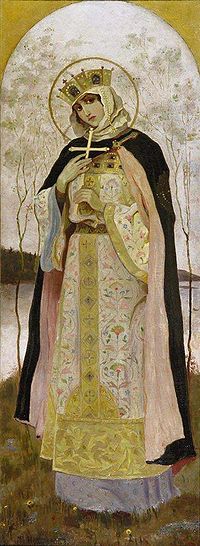- Olga of Kiev
-
Holy Equal-to-the-Apostles Olga 
Saint Olga by Mikhail NesterovPrincess of Kiev Born c. 890 Died 11 July 969
KievHonored in Eastern Orthodoxy, Roman Catholicism Feast July 11 Saint Olga (Russian and Ukrainian: Ольга, also called Olga Prekrasna (Ольга Прекрасна), or Olga the Beauty, hypothetically Old Norse: Helga In some Scandinavian sources she was called other name.[1] born c. 890 died 11 July 969, Kiev) was a ruler of Kievan Rus' as regent (945–c. 963) for her son, Svyatoslav.
In 1997 the Order of Princess Olga was established in Ukraine.
Contents
Early life
St. Olga was born in c. 879.
Regency
At the start of her son's reign, Olga spent great effort to avenge her husband's death at the hands of the Drevlians, and succeeded in slaughtering many of them and interring some in a ship burial, while still alive. She is reputed to have scalded captives to death and another, probably apocryphal[citation needed], story tells of how she destroyed a town hostile to her. She asked that each household present her with a dove as a gift, then tied burning papers to the legs of each dove which she then released to fly back to their homes. Each avian incendiary set fire to the thatched roof of their respective home and the town was destroyed. More importantly in the long term, Olga changed the system of tribute gathering (poliudie) in what may be regarded as the first legal reform recorded in Eastern Europe.
Christianity
She was the first Rus' ruler to convert to Christianity, either in 945 or in 957. The ceremonies of her formal reception in Constantinople were minutely described by Emperor Constantine VII in his book De Ceremoniis. Following her baptism she took the Christian name Yelena, after the reigning Empress Helena Lekapena. The Slavonic chronicles add apocryphal details to the account of her baptism, such as the story how she charmed and "outwitted" Constantine and how she spurned his matrimonial proposals. In truth, at the time of her baptism, Olga was an old woman, while Constantine had a wife.
Olga was one of the first people of Rus' to be proclaimed a saint, for her efforts to spread the Christian religion in the country. Because of her proselytizing influence, the Orthodox Church calls St. Olga by the honorific Isapóstolos, "Equal to the Apostles". However, she failed to convert Svyatoslav, and it was left to her grandson and pupil Vladimir I to make Christianity the lasting state religion. During her son's prolonged military campaigns, she remained in charge of Kiev, residing in the castle of Vyshgorod together with her grandsons. She died soon after the city's siege by the Pechenegs in 969.[2][3]
Relations with the Holy Roman Emperor
Seven Latin sources document Olga's embassy to Holy Roman Emperor Otto I in 959. The continuation of Regino of Prüm mentions that the envoys requested the Emperor to appoint a bishop and priests for their nation. The chronicler accuses the envoys of lies, commenting that their trick was not exposed until later. Thietmar of Merseburg says that the first archbishop of Magdeburg, Saint Adalbert of Magdeburg, before being promoted to this high rank, was sent by Emperor Otto to the country of the Rus' (Rusciae) as a simple bishop but was expelled by pagan allies of Svyatoslav I. The same data is duplicated in the annals of Quedlinburg and Hildesheim, among others.
See also
- Christianization of Kievan Rus'
- List of Ukrainian rulers
- Rulers of Kievan Rus'
- List of Russian rulers
Preceded by
Igor of KievPrincess of Kiev
as Regent
945–960sSucceeded by
Sviatoslav the BraveReferences
- ^ In saga of Olaf Tryggvason mother of Vladimir I, Olga was called Allogia.
- ^ extracts of the Primary Chronicle in English translation, University of Oregon
- ^ Primary Sources - A collection of translated excerpts on Medieval Rus, University of Washington Faculty Web Server (November 6, 2004)
External links
Categories:- Women of medieval Rus'
- Rulers of Kievan Rus'
- Viking Age women
- Women in Medieval warfare
- Female regents
- Equal-to-apostles
- Eastern Orthodox saints
- Russian saints
- Ukrainian saints
- Ukrainian Roman Catholic saints
- Russian Roman Catholic saints
- 890 births
- 969 deaths
- Rurik Dynasty
- 10th-century rulers in Europe
- 10th-century female rulers
- 10th-century Christian female saints
- Orthodox monarchs
- Ukrainian women in politics
Wikimedia Foundation. 2010.
